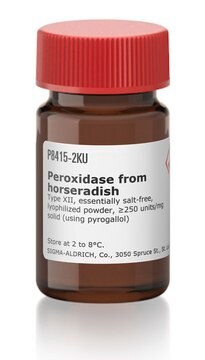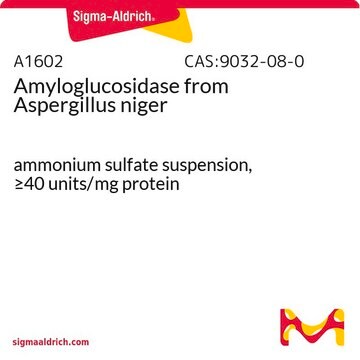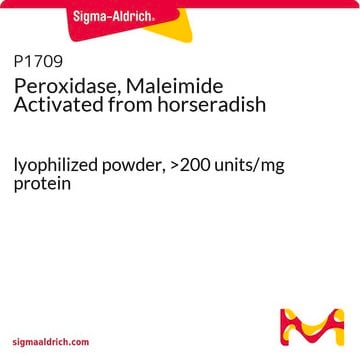P8125
Peroxidase from horseradish
Type I, essentially salt-free, lyophilized powder, ≥50 units/mg solid (using pyrogallol)
Synonym(s):
Donor:hydrogen-peroxide oxidoreductase, Horseradish peroxidase
About This Item
Recommended Products
type
Type I
Quality Level
form
essentially salt-free, lyophilized powder
specific activity
≥50 units/mg solid (using pyrogallol)
mol wt
~44 kDa
solubility
0.1 M phosphate buffer: soluble (pH 6.0)
H2O: soluble
absorbance ratio
RZ ≥1.0
storage temp.
2-8°C
InChI
1S/H2O3/c1-3-2/h1-2H
InChI key
JSPLKZUTYZBBKA-UHFFFAOYSA-N
Looking for similar products? Visit Product Comparison Guide
General description
Application
- in fecal starch analysis
- to measure plasma glucose levels by Trinder method
- to incubate feruloylated arabinoxylan fractions and also to evaluate oxidative coupling
- in the detection of glycoproteins
Biochem/physiol Actions
Unit Definition
Analysis Note
Other Notes
inhibitor
substrate
Signal Word
Danger
Hazard Statements
Precautionary Statements
Hazard Classifications
Resp. Sens. 1
Storage Class Code
11 - Combustible Solids
WGK
WGK 1
Personal Protective Equipment
Regulatory Listings
Regulatory Listings are mainly provided for chemical products. Only limited information can be provided here for non-chemical products. No entry means none of the components are listed. It is the user’s obligation to ensure the safe and legal use of the product.
JAN Code
P8125-116MU:
P8125-200KU:
P8125-5KU:
P8125-BULK:
P8125-25KU:
P8125-50KU:
P8125-VAR:
P8125-100KU:
Certificates of Analysis (COA)
Search for Certificates of Analysis (COA) by entering the products Lot/Batch Number. Lot and Batch Numbers can be found on a product’s label following the words ‘Lot’ or ‘Batch’.
Already Own This Product?
Find documentation for the products that you have recently purchased in the Document Library.
Customers Also Viewed
Articles
Discover our peroxidase from horseradish enzymes, products, substrates, and inhibitors for your ELISA, immunoassay, and protein application needs.
Protocols
Reinheitszahl (RZ) is the ratio of absorbance due to hemin (A403, Soret region) to absorbance due to protein (A275).
To standardize a procedure for the assay of Peroxidase using 2,2'-Azino-bis(3-Ethylbenzthiazoline-6-Sulfonic Acid) as a substrate.
This procedure is for the determination of Peroxidase enzymatic activity using Pyrogallol as the substrate.
Our team of scientists has experience in all areas of research including Life Science, Material Science, Chemical Synthesis, Chromatography, Analytical and many others.
Contact Technical Service











